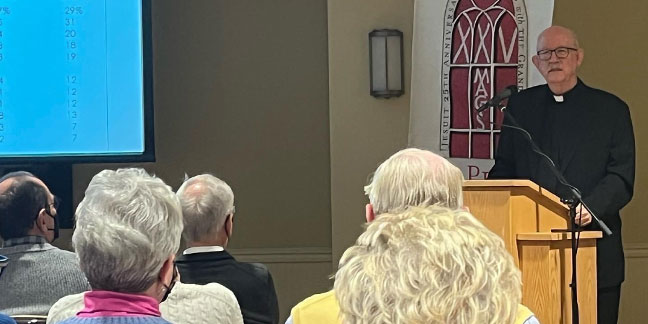 CHARLOTTE — Divine providence surely played a role in lining up Jesuit Father Thomas Gaunt as the keynoter for the 22nd annual Kennedy Lecture Jan. 29 at St. Peter Church.
CHARLOTTE — Divine providence surely played a role in lining up Jesuit Father Thomas Gaunt as the keynoter for the 22nd annual Kennedy Lecture Jan. 29 at St. Peter Church.
The Diocese of Charlotte is celebrating its 50th anniversary, and Father Gaunt, who just celebrated 50 years as a Jesuit, has a unique history with the diocese that impacts us today.
“I was here before St. Peter was a Jesuit parish,” Father Gaunt told the dozens of parishioners who braved the snow that Saturday morning to hear his talk, “Our Journeying Together: Who Are We Listening To? Who Are We Accompanying?”
The parish’s annual Kennedy Lecture series aims to challenge and stimulate thinking by engaging prominent people in the field of religion and ethics.
When Father Gaunt arrived in the diocese in 1981, only months after his ordination, he lived in Hot Springs and began a ministry at Mars Hill College. Over the course of his 10-year ministry in the diocese, he served as an assistant pastor and pastor.
In 1987 he served as the director of the diocese’s Office of Planning and Research, where he coordinated the diocesan Synod, putting his master’s degree in public administration to work in service to the people of God in western North Carolina.
For the past 11 years, Father Gaunt has served as the executive director of CARA, the Center for Applied Research in the Apostolate, at Georgetown University.
He focused this year’s Kennedy Lecture on what CARA research points to in Catholic and other religious communities’ populations and how people are practicing their faith.
Despite all the gloom and doom in secular media, he shared, “the Catholic community has remained fairly stable.” He noted, however, that overall “we are becoming more and more a religiously disconnected people.”
There has been an increased decline among other Christian denominations, and an increase in the “nones,” people who claim no religious affiliation.
The total Catholic population in the U.S. has increased year over year, “but Catholics are becoming less engaged in sacramental life at a parish,” he said.
Interestingly, Catholics who are not going to Mass are finding other ways to engage in their faith by participating in Bible studies or service organizations.
“People are looking to belong,” Father Gaunt explained.
He also noted that mobility plays a factor in the changing landscape of parishes. The massive shift of people from the Rust Belt to the Sun Belt, for example, has created a population boom and the need for more churches in the South.
“Here in Charlotte, it’s building and building, and these kind of ‘megachurches.’ … And this is not because the local pastors are incredible evangelizers,” he joked.
“When talking about this in the diocese, when you mention this, pastors are just overwhelmed at the sheer number. Our estimates are there are hundreds, if not thousands, of people every Sunday (pre-pandemic) who are not coming to church because they can’t get into the parking lot.
“They (churches) can’t keep up. There just isn’t enough room.”
Immigration also has expanded the Church in the U.S., he said. “The Catholic community in North Carolina today is a majority minority community,” he said, yet “if we look into our churches and our engagement, that is not what we see.”
He asked, “Who are we actively listening to? Are we? How are we accompanying one another if we are not seeing some mixing of these communities?”
What we need is a radical welcome, he said.
“A parish is a constantly changing community. If you see a parish as a stable community, it is not that. You are missing the boat.”
“We have to turn that upside down, and as a parish understand that we are a constant, changing group.”
The most important thing is to invite and welcome Catholics into the pews, he urged.
In his closing remarks, Father Gaunt recalled that the diocese’s first bishop, Bishop Michael Begley, journeyed with and listened to the poor of Appalachia – with orphans and refugees and those who were so often made invisible to society.
“Listening is a civic virtue, and it is a requirement if we are to be evangelizing disciples as Catholics,” Father Gaunt said. “Pope Francis commends to us that it is in listening, in journeying together, that we most clearly manifest ourselves as the people of God.”
— SueAnn Howell, Senior reporter
Watch online
At www.stpeterscatholic.org: Watch video of the 22nd annual Kennedy Lecture
‘Listening is a civic virtue, and it is a requirement if we are to be evangelizing disciples as Catholics.’
Jesuit Father Thomas Gaunt
Former Diocese of Charlotte planning director and 2022 Kennedy Lecturer


